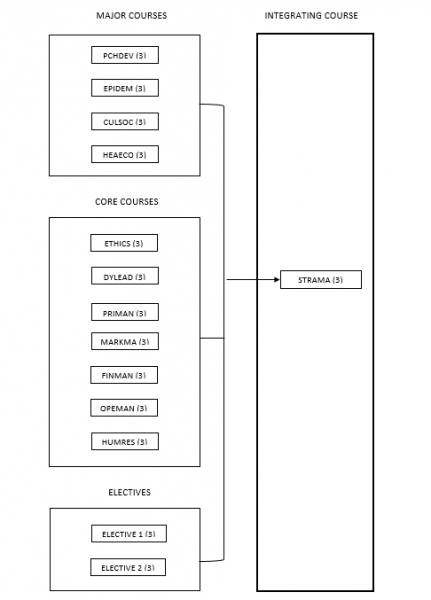About the Program
Designed for leaders of health service organizations who would like to explore new paradigms for taking on the opportunities and challenges of a rapidly transforming public and private health sector
The increasing demands of our rapidly expanding population, the growing complexities of health care services, and the challenges of globalization have made it even more critical for us to develop a new brand of leadership for health care institutions, both public and private.
This new leader/manager should be equipped with the appropriate managerial skills and attitudes to efficiently and effectively direct scarce resources to help build a health care delivery system that is responsive to the needs of our people in terms of availability, accessibility, and affordability.
The MBA in Health program is designed for leaders of health service organizations who find themselves managing their organizations without having had the benefit of previous formal management training. This degree program offers a new model for training leaders for the health care industry by providing them not just with the necessary business frameworks and tools, but also a broad understanding of the challenges and opportunities posed by this rapidly transforming sector.
Students enrolled in the program cover a broad spectrum of professional and educational backgrounds, including physicians, nurses and allied health professionals, as well as accountants and engineers. Its interactive and student-centered program design enables students to learn from each other as well as from a faculty lineup that includes many distinguished medical and business practitioners as well as senior academics.
Distinctive Features
Curriculum
- Specialized program providing management education to professionals who would like to pursue careers leading to top management positions in health care organizations
- Modular approach, with specified daily learning outcomes, activities and assignment
- Focused not just on theories and techniques but also on values and personal transformation
- Requires a total of 14 courses (42 units in total) made up of 12 core courses and 2 electiveS
- Non-thesis program, with an integrating Strategic Management paper as the terminal requirement
Program Delivery
- Cohort-based part-time program designed for working professionals
- The program follows a trimestral schedule and the entire program can be completed in seven trimesters of 14 weeks each, or a total of two years and 4 months.
- Each student takes two classes per trimester; each class meets three hours per week for a total of 14 weeks All classes are delivered on Saturdays
- Student-centered focus requires students to take greater responsibility for their own learning
- Workplace-based approach will require students to draw on their personal and professional experiences, and apply their learnings to their work even as they undergo the program
- Faculty are facilitators of learning rather than lecturers
- Maximum of 25 students per class
- The MBA in Health Program is offered at our main campus in Rockwell Center, Makati City, and our satellite campus in Clark Field, Pampanga
The MBA in Health Program Curriculum
General Description
- The MBA in Health is offered on a trimestral basis. Class work is one (1) day a week (Saturdays) with two courses of three hours each per session for fourteen (14) sessions per trimester.
- The program is completed in seven (7) consecutive trimesters or a total of twenty eight (28) months. Students with a fixed load of six (6) units per trimester are able to complete the academic requirements within this period. Students who develop their strategic management paper early during their course work can graduate by the last (7th) trimester.
- The maximum load per trimester is two (2) courses. Additional load requires approval from the director of MBAH.
- The MBA in Health Program consists of the following courses:
Major Course 12 units Core Courses in Management 21 units Electives 6 units Integrating Course 3 units Total 42 units - The required health care core courses serve as foundation and context by which the student is challenged to understand and apply the structure and operation of health care systems. The major MBA courses give the student a solid mastery of management fundamentals.
- Attendance in all courses is required. Absence from class for a total of 20% of sessions per course may be considered as excused absences.
- Instructional methodology is of graduate level quality. To provide the students with the foundation for professional practice of general management in the health care enterprise, a combination of lectures, workshops, home-reading assignments, case studies, field work, self-learning modules and directed research are used that:
- Provide factual and practical knowledge of the health care field
- Strengthen the student’s faculties of analysis, problem-solving, and decision-making
- Challenge the student’s initiative and self-discipline
- Encourage independent thought, intensity of purpose, freedom from bias, thoroughness of inquiry, originality and creativity
- Promote group interaction and cooperation, and
- Foster a high sense of professional responsibility.
| COURSES | CODES | UNITS |
|---|---|---|
| 1. Major Courses | ||
| Principles and Concepts in Health and Development | MHPCHDEV | 3 |
| Managerial Epidemiology | MBEPIDEM | 3 |
| Health, Culture, and Society | MHCULSOC | 3 |
| Health Economics for Managers | MBHEAECO | 3 |
2. Core Courses |
||
| Ethics in Health Care | MBETHICS | 3 |
| Dynamics of Leadership | MHDYLEAD | 3 |
| Principles and Dynamics of Management | MHMANPRI | 3 |
| Marketing Management | MBMARKMA | 3 |
| Financial Management | MHFINMAN | 3 |
| Operations Management | MHOPEMAN | 3 |
| Human Resource Management | MBHUMRES | 3 |
3. Electives (choose 2) |
||
| Health Informatics | MBHINFO | 3 |
| Entrepreneurship | MBENTREP | 3 |
4. Integrating Course |
||
| Strategic Management | MBSTRAMA | 3 |
Course Descriptions
- Major Courses
- Principles and Concepts in Health and Development (MHPCHDEV)
This is a core course in the MBA-Health program that grounds the students on the Philippine health system. Students are introduced to the concepts of health and development and to the workings of the health system. Elements of the health system are analyzed and stakeholders identified. Students are asked to look at how these elements and stakeholders interact, either in synergy or in opposition to each other, as the health system moves towards improving the health of the people.The course stresses the need for a more rational, coherent and enlightened understanding of the workings of the health system so that the fragmentation and disconnectedness that pervade the current system can be reformed by influencing the way people think, feel and behave about health.Students are also asked to confront the roles they play, as health professionals representing various sectors and disciplines, in this process of transformation. The end goal of the course is to provide the students with a relevant context for the application of the competencies they will learn as leaders and managers in the health sector. - Managerial Epidemiology (MBEPIDEM)
This course is an introduction to the use of epidemiology in management and decision-making for the graduate student. The student will learn to use an epidemiological model for the delivery of health care services, methods for measuring need and health, analytic approaches to decision-making when evaluating the impacts of health care programs and policies, and how to apply epidemiology in program planning and selected specialty areas. - Health, Culture and Society (MHCULSOC)
The course will introduce perspectives from the social sciences and their possible applications for health care, particularly the development of cultural competence. Using a cross-cultural survey of different medical systems- with emphases on those found in the Philippines-the course will underscore the need to look at the diversity of meanings, beliefs, symbols and rituals around health care, both “western” and “non-western”. The course will also look at the ways different societies organize themselves for health care in the popular, folk and professional sectors, often in response to challenges posed by the environment. Finally, the course will look at how macro structures and institutions- locally and globally-shape health care systems in different social and historical settings. - Health Economics for Managers (MBHEAECO)
The course is an introduction to health economics or the use of economics in the health sector. There are two branches of health economics: micro and macro. The former focuses on economic behavior of individuals and firms while the latter focuses on system structure and complex interactions between the structural components that affect national health system outcomes. Both branches are important in understanding health care policies and management decisions and the course will cover both.Economic theory and analysis influence health decision-making and the course will provide the students with an economic framework to understand how the Philippine health system is structured. The course will also deal with the issue of allocation of limited health care resources. Further, the conduct of economic evaluation of healthcare interventions will be deliberated in class.
- Principles and Concepts in Health and Development (MHPCHDEV)
- Core Courses
- Ethics in Health Care (MBETHICS)
Many business schools in the world today require Business Ethics courses in order “to educate men and women on a heightened sense of their moral and social responsibilities.” (Can Ethics be Taught: Approaches at Harvard Business School 1993) There is a growing recognition that managers have a tremendous power to shape not only business organizations but the surrounding community as well. In light of recent business scandals in the United States, the public is increasingly demanding that managers use this power with care and that business be accountable to society at large.Managers in the health care business are not exempt. In fact, there is an even greater call for ethical behavior in this field because it generally deals with vulnerable populations.Health care ethics has traditionally been taught within the confines of the patient-doctor relationship. In truth, health care ethics necessarily concerns the larger community where conflicts of interests are often the norm rather than the exception. Thus, there is a need for health care providers—managers and practitioners alike—to be capable of ethical deliberation and action.The course will discuss the foundations of ethics in general and of health care ethics in particular. It will also attempt to help students improve their ethical decision making by presenting a model for ethical reasoning that may be used in analyzing dilemmas confronting health care managers.
- Dynamics of Leadership (MHDYLEAD)
This course aims to introduce the students to a depth of thinking about individuals and collective patterns of leadership practices called for in this Master’s program. Designed as an interactive and reflective course, the learning interventions will focus on guiding the students to reflectively process or understand leadership patterns and dynamics as applied in their personal and professional lives. Reflective/critical thinking and ethics based reasoning and decision-making are emphasized. - Principles and Dynamics of Management (MHPRIMAN)
The course provides learners with an understanding of the role of management and the analytical tools to competently cope with the challenges facing today’s management. Business enterprises and non-profit organizations operate within a complex and rapidly changing global environment. The field of management is undergoing a revolution. Globalization, economic deregulation, trade liberalization, technological advancement and the widening of the urban poor have created new threats and opportunities confronting managers. This course is designed to familiarize learners with the accepted management standards, procedures and techniques employed by corporate, business and functional level managers. - Marketing Management (MBMARKMA)
The course is designed to provide learners with a formal training on the fundamental concepts and practices of Marketing in the context of the new economy. It will also focus on the formulation and implementation of marketing strategies in the areas of research, products and services, pricing, distribution, advertising and promotion, market analysis, alternative approaches to competition, brand building, and revenue-generating activities. These strategies, to serve their purpose, are best aligned to the business environment, hyper competition, digitalized technologies, the empowered consumer, and the country’s widening base of the poor. This course will likewise help learners gain a good understanding of administrative processes where marketing plays a central role in the game of demand creation and customer satisfaction. Finally, everyone will get to appreciate, by the latter part of the 15 sessions, that Marketing is indeed a powerful contributor to nation building. - Financial Management (MHFINMAN)
This course deals with decision making under uncertainty for corporate financial management designed particularly for health care institutions. Critical evaluation of concepts is emphasized to assess their usefulness in practical business situations. Problem-solving methodology is used to illustrate the theories and tools in financial decision making including the use of health demographics to help with the financial evaluation studies.More importantly, this course tackles the ethical issues and dilemmas faced by the financial manager in his day-to-day work as chief financial officer for a healthcare institution with a very important primary mission of service to its patients. The students will be taught how to resolve these ethical dilemmas. - Operations Management (MHOPEMAN)
The course covers in-depth discussion/study of specific Operations Management (OM) philosophies, concepts, trends, tools and techniques to highlight the importance of OM in a manufacturing or service organization’s pursuit of strategic goals and objectives. It focuses on strategic and tactical issues covering quality management, process management, and supply chain management.While providing students with technical and quantitative tools, it will focus more on the managerial aspect of operations, as well as on the ethical and social implications of OM decisions. - Human Resource Management (MBHUMRES)
Management is generally about making other people produce the results that one desires. An organization’s human resources is therefore of paramount value, being responsible for producing the outputs and outcomes that the organization is designed to do. The course emphasizes the need for the alignment of human resource management policies, practices, and programs with the goals, strategies, and values of the organization. It presents tools for enabling the learner to understand the most vital resource of the organization-its people.It provides a fresh perspective on the role of Human Resource Management and the function of the Human Resource Management Officer as an agent of change, in partnership with top management. The course describes how, together, they can build one of the most critical sources of sustainable competitive advantage-an organization whose design, culture, and people are aligned with strategy and values.It addresses the need for functional, if not high performing human resource management systems, such as recruitment and selection, induction, compensation and benefits, performance management, rewards and incentives, learning and development, retention, and work-force relationships from a strategic perspective. A discussion on the need to build a culture that will encourage high levels of productivity is also included.
- Ethics in Health Care (MBETHICS)
- Electives
- Health Informatics (MBHINFO)
The course will provide students concepts and tools in managing technology in health. The management of information has become a key competitive advantage among healthcare enterprises. New technologies such as the Internet and mobile have given rise to new channels of delivery.In comparison to other health informatics courses, this course was developed particularly with a management perspective. This course will provide an overview of health informatics, public health informatics. Key concepts in hospital information systems such as electronic health records and clinical decision support will also discussed. - Entrepreneurship (MBENTREP)
Entrepreneurship has traditionally been understood as simply starting up a new business outside of the corporate setting. The course addresses the problem that a start-up entrepreneur faces – having a business just like a hundred other businesses that are competing for a shrinking market. At the same time, the heads of big businesses, awash with cash and basking in past success think nothing can go wrong with a new venture, become lax, only to find their sales and cash flow diminishing.The course focuses not only on new businesses, but also on existing businesses that are faced with a changing or changed environment where industries change, customer needs and demands change, and the tide of the economy can also turn against the business. The entrepreneur must know how to rejuvenate products, processes, markets, and the way one does business.
- Health Informatics (MBHINFO)
- Integrating Course
- Strategic Management (MBSTRAMA)
The course serves as the capstone course for the MBA program. It aims to enable the learners develop and implement strategic cross-functional decisions towards the attainment of their organizations’ vision, mission and objectives using strategic management principles and integrating knowledge and skills acquired by the learners from the other MBA courses.The learners will apply the strategic management process consisting of strategy formulation, strategy implementation and strategy evaluation, as well as the various analytical frameworks and strategy formulation tools that can aid them in strategic decision making. Through this course, the learners’ strategic thinking capability is expected to be strengthened as they are made to critically analyze and integrate information about their companies’ external and internal environment in the local and global context, and to use this in formulating and implementing innovative strategies that can help their companies build a sustainable competitive advantage. The learners will likewise be made to understand the different strategy choices and to evaluate strategic management issues and concepts that are important to managing in today’s global environment. This course also aims to promote among its learners ethical business decisions, the practice of corporate social responsibility and making a contribution towards nation building.
- Strategic Management (MBSTRAMA)
Contact Details
- Director: Ayedee Ace M. Domingo, II, MD, MBA
(8899.7691 – 96 loc. 2209)
aadomingo@ateneo.edu - Contact Person: Andrew Ferrer
(8899.4589, 8899.7691 -96 loc. 2211)
aferrer@ateneo.edu




